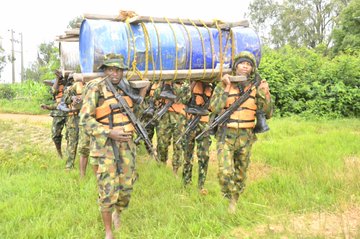The National Human Rights Commission (NHRC) is preparing to release the results of a highly anticipated investigation into allegations of forced abortions and child killings by the Nigerian military in the northeast.
The report follows explosive claims made in a 2023 Reuters investigation, which accused the military of running a secret abortion program targeting women impregnated by insurgents and committing atrocities against children during counter-insurgency operations.
The NHRC, an independent body appointed by the Nigerian government, formed a special panel in February 2023 to probe the allegations.
The investigation included numerous hearings in Abuja and Borno State, a region deeply affected by the ongoing insurgency.
These hearings were designed to gather testimony and evidence, with a focus on the claims made by Reuters that the military had orchestrated systematic forced abortions and child killings.
The military has strongly denied the allegations, calling them “unfounded and malicious.”
However, the NHRC’s findings, set to be made public on Friday, could have significant implications for the military’s actions in the region.
On Thursday, the NHRC issued invitations to the media for the public release of the report, marking the conclusion of a nine-month-long investigation into the explosive claims.
Reuters, which first broke the story, has not been able to independently verify what conclusions or recommendations the NHRC panel may present.
Obinna Jude Nwakonye, the NHRC’s head of corporate affairs, signed the invitations but declined to comment further on the findings.
The investigation has raised questions about the effectiveness of the NHRC in holding government officials accountable.
Rights groups have long criticized the commission for its perceived lack of success in prosecuting high-ranking officials involved in human rights abuses.
This criticism has been echoed by both the United Nations and the U.S. State Department, which have pointed to the NHRC’s limited track record in ensuring accountability.
Despite these criticisms, the NHRC has had some successes in holding the government to account.
For example, in 2020, the NHRC played a crucial role in documenting the abuses committed by the Special Anti-Robbery Squad (SARS), which led to the police unit’s disbandment following widespread protests.
In the same year, the NHRC also helped establish a state judicial panel to investigate the fatal shooting of protesters by the Nigerian military and police in Lagos.
The Lagos panel found that at least 11 people had been killed, but the government rejected the findings, citing alleged errors and lack of evidence.
The current investigation by the NHRC focuses on disturbing new allegations.
In December 2022, Reuters reported that the Nigerian military was behind a program that had forcibly terminated over 10,000 pregnancies among women and girls.
Many of these women were victims of kidnapping and assault by Islamist militants, primarily from the extremist group Boko Haram.
The report also detailed accounts from over 40 soldiers and civilians who claimed to have witnessed military personnel killing children or discovering children’s bodies after military operations.
The allegations have shocked the public, as Boko Haram’s violence continues to terrorize northeastern Nigeria.
The group, which emerged as an extremist Islamist movement in the early 2000s, has been responsible for countless atrocities, including the abduction of 276 schoolgirls from Chibok in 2014.
While Boko Haram has been weakened by military offensives in recent years, it remains a potent threat, carrying out deadly attacks on civilians and government targets.
The ongoing conflict has had devastating consequences for women and children, many of whom have been coerced into joining the insurgency as fighters or suicide bombers, according to human rights groups and academics.
Human rights advocates hope the NHRC’s investigation will shed light on the military’s conduct and bring justice to the victims of these alleged atrocities.
However, the report’s outcome remains uncertain, as the government and military continue to deny any wrongdoing.

